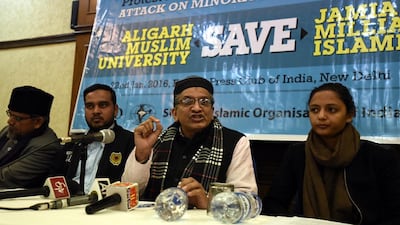DUBAI // UAE residents who are past students of India’s oldest Muslim university said they were ready to lend financial and moral support in the institution’s fight to retain its minority status.
The Aligarh Muslim University (AMU), which was founded in 1875 to educate Muslims, has lost three legal battles in Indian courts.
India’s constitution allows religious and linguistic minorities to establish and administer educational institutions to conserve their language and religion.
The law guarantees that the government will not discriminate in providing support.
If AMU loses its minority status, it could be forced to follow the central government’s rules on admissions and education, according to its vice chancellor, Zameer Uddin Shah.
“AMU is the identity of Muslims in India. It was created by them. Keeping its minority status is important for Muslims in India,” Mr Shah said.
“We lost three court judgments against giving minority status to AMU, but we have been able to get a stay of proceedings order from the supreme court of India. In theory we remain a minority institution.
“The university needs moral and financial support from its generous alumni in the UAE.”
There are more than 4,000 AMU alumni in the UAE and more than 15,000 in the GCC.
The university is in Aligarh, a city in the northern state of Uttar Pradesh. It has 28,000 students, 70 per cent of whom are Muslim.
“The government cannot interfere in AMU’s educational system and its ways to promote education within its community,” said Kamran Ziauddin, an AMU graduate in Abu Dhabi. “Minority status is a right given to religious minorities and institutions by the constitution.”
AMU’s opponents, however, such as Indian attorney general Mukul Rohatgi, said institutions should not be created for a particular segment of society because that would breach India’s secular constitution.
Mr Rohatgi appeared before the supreme court last month to argue against allowing AMU to retain its minority status.
Qutubur Rehman, president of the AMU Alumni in the UAE group, said the alumni stood with the institution.
“We are ready to support AMU in this crucial stage, both morally and financially,” said the 50-year-old businessman, who graduated in 1990.
“AMU has educated a large number of Muslims in India. Although AMU has a secular outlook, it tries to preserve the social and religious identity of Muslim students, which encourages conservative Muslim families to send their children there for higher education.”
Mr Shah said AMU had a strong connection with the UAE and enjoyed a close relationship with UAE royalty.
“The UAE royals have visited the university several times. Sheikh Zayed inaugurated the Petroleum Institute. We do hope that our relations will grow with time. We always sincerely welcome UAE students to come and study with us,” Mr Shah said.
There are thousands of minority education institutions in India, most of them serving the Muslim community.
Jamia Millia Islamia in Delhi, another university with minority status, has had its status questioned and challenged by the authorities.
akhaishgi@thenational.ae

